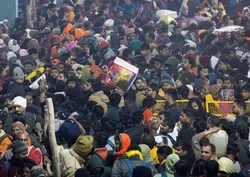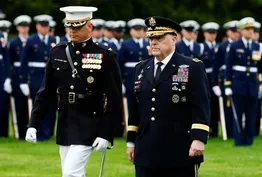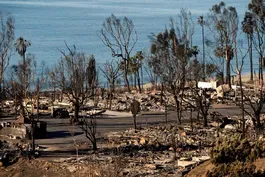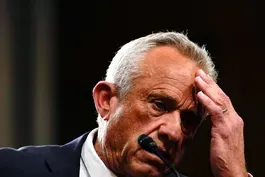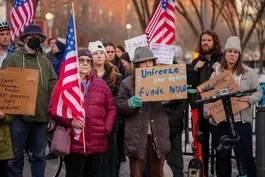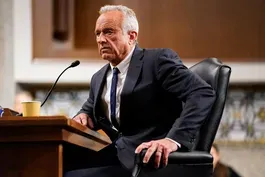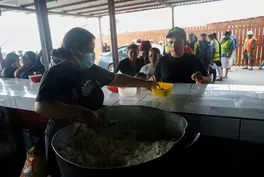
Nation’s Report Card shows struggle of post-COVID education
Clip: 1/29/2025 | 8m 10sVideo has Closed Captions
Nation’s Report Card paints bleak picture of education in aftermath of the pandemic
American students continue to struggle in both reading and math, and the gap between the highest and lowest performing kids is widening to historic levels. Data from the Nation’s Report Card shows test scores are still below pre-pandemic numbers. Amna Nawaz discussed more with Gov. Jared Polis of Colorado and chair of the National Governors Association.
Major corporate funding for the PBS News Hour is provided by BDO, BNSF, Consumer Cellular, American Cruise Lines, and Raymond James. Funding for the PBS NewsHour Weekend is provided by...

Nation’s Report Card shows struggle of post-COVID education
Clip: 1/29/2025 | 8m 10sVideo has Closed Captions
American students continue to struggle in both reading and math, and the gap between the highest and lowest performing kids is widening to historic levels. Data from the Nation’s Report Card shows test scores are still below pre-pandemic numbers. Amna Nawaz discussed more with Gov. Jared Polis of Colorado and chair of the National Governors Association.
How to Watch PBS News Hour
PBS News Hour is available to stream on pbs.org and the free PBS App, available on iPhone, Apple TV, Android TV, Android smartphones, Amazon Fire TV, Amazon Fire Tablet, Roku, Samsung Smart TV, and Vizio.
Providing Support for PBS.org
Learn Moreabout PBS online sponsorshipAMNA NAWAZ: American students continue to struggle in both reading and math.
And the gap between the highest- and lowest-performing kids is widening to historic levels.
That's all according to new data from a biennial national test administered to fourth and eighth graders known as the Nation's Report Card.
Across the board, test scores remain below pre-pandemic numbers.
Compared to 2019, fourth graders dropped three points in math and five points in reading.
Eighth graders dropped eight points in math and five points in reading.
The lone exception was a slight uptick in fourth grade math results compared to 2022.
We're joined now by Jared Polis.
He's the governor of Colorado and chair of the National Governors Association, where he's leading a new bipartisan education policy initiative.
Governor, welcome.
Thanks for being with us.
GOV.
JARED POLIS (D-CO): A pleasure joining you.
AMNA NAWAZ: So, as you know, the federal government sent some $190 billion to schools across the country since 2021 moving out of the pandemic.
A lot of people thought that would help us to see a bounce-back from those pandemic numbers.
Aside from fourth grade math, as we just showed, we didn't see that.
Why not?
GOV.
JARED POLIS: So here's what was announced today and why this is news.
This is called NAEP, which is also called Nation's Report Card.
This is basically the same test given to fourth graders, to eighth graders in all 50 states.
What we normally have at any given year is, we have state standardized tests, but guess what?
They're different from state to state.
So it's really hard to compare.
That's why this Nation's Report Card in NAEP is so important.
It allows us to compare between Alabama, California, Colorado.
What we did with our GEER funds and our ESSA funds, which were some of the one-time funds you mentioned over the last couple of years from the federal government is, we were able to really target them around the areas that we thought were most in need of improvement.
Namely, we identified areas like math, fourth grade, eighth grade math.
And guess what?
We saw significant improvements in Colorado, particularly among students of color, in those areas.
And it's really a question of how we can target the resources we have towards those who most needed to be able to achieve at grade level.
It shouldn't just take the federal government doing this.
And states are major funders of education.
For most states, like Colorado, it's between a quarter and a third of the budget.
It's the single biggest line item for most states.
And states and governors really need to step up and drive better results in the schools, because we have the leverage of being funders of our schools across our states.
AMNA NAWAZ: So, Governor, does that say to you, the fact that we saw declines everywhere else and you saw some improvement in Colorado, you're saying, does that say to you that you might be worried the funds were not used the way they could or should have been across the board?
GOV.
JARED POLIS: Well, there were some -- there are some bright lights, and we always try to learn from the bright lights.
Louisiana was another bright light of significant increases.
So what you always try to do in education, both within a state and across the states, is say, hey, look, here's some examples of what works.
In fact, part of what we use the federal money for in Colorado is what we called Bright Spot Awards.
Schools, and we had them in Colorado a few dozen, even during the pandemic years, had significant increases and improvements in student achievement.
And we said, wow, we need to elevate that.
We gave them awards of $50,000.
But, more importantly, we tried to learn what the practices were that led to significant increases in student achievement, two bands in our state accountability matrix they improved, and trying to spread those best practices to other schools across our district.
So you look for those bright spots.
At the same time, you look for, OK, where were some of the decreases?
What does that show the red flashing light on that we need to change, both at the district level and at the state level?
AMNA NAWAZ: You know, the other alarming trend in the data is the divergence between the highest- and lowest-achieving students.
If you just look at eighth grade math results, for example, it shows that the highest-achieving students, the kids in the 90th and the 75th percentile, they bounced back since 2022.
Students in the lower-achieving percentiles, 25th, 10th percentile, they're still seeing alarming learning loss.
What do you think explains that difference?
GOV.
JARED POLIS: Well, where we think we can make a difference is after-school hours, first and foremost, so additional tutoring, support after school.
We did a master license for some of the best mathematics software and used data, best data-driven professional development to drive interventions that work to make teachers be able to teach even better in those areas.
Another one that we did in Colorado we're just beginning to see the results of, so it wouldn't show up in this NAEP, is we instituted universal free preschool two years ago, right?
So those kids are now in first grade.
We will see how they show up in fourth grade in another three years, but all the data points to the fact that a high-quality early childhood education prevents some of those gaps you mentioned, namely for low-income, for English language learners.
It prevents those gaps from occurring in the first place if kids have high-quality preschool and kindergarten.
AMNA NAWAZ: While I have you, Governor, I need to ask about a story reported on earlier, which is the confirmation hearing of Robert F. Kennedy Jr. to lead the Department of Health and Human Services.
We saw some very tough lines of questioning from your fellow Democrats, including your fellow Coloradan Senator Michael Bennet.
You have booked your party, though.
Many of them oppose his nomination.
You said you have supported it.
Why?
GOV.
JARED POLIS: Well, I didn't get to watch the nominations today.
Obviously, we're focused on issues in the state, improving education, and reducing health care costs.
But, look, I hope that we have somebody that we can work with.
I was very critical of President Trump's last head of that agency, which was Secretary Azar at the time, a pharmaceutical lobbyist who became the head of the agency, literally the fox guarding the henhouse for pharmaceuticals.
I'm hopeful they can be more independent.
I'm hopeful that we can continue to work with the Department of Health and Human Services on our waivers that we need for flexibility on Medicaid spending and to import lower-cost prescription drugs from other countries.
We have a pending application to do that before them as well.
AMNA NAWAZ: I also want to ask you, on the immigration front, of course, there's been a lot of talk about the city of Aurora in Colorado.
There were some headlines about a pending ICE raid there.
We know President Trump has focused on this city in particular and said it was taken over by Venezuelan gangs.
It was also reported the ICE enforcement operation was called off due to leaks about the details there.
What can you tell us about anything you have heard about that potential operation and are Colorado law enforcement officials working with federal officials on this?
GOV.
JARED POLIS: I can tell you shockingly little, because the administration did not reach out to us about any kind of action in Colorado.
So we don't know exactly what they're planning.
If they are planning on going after criminals, we are ready to help however we can to locate people that have violated our laws.
And whether they're American citizens or whether they're immigrants, we want to make sure that we can apprehend criminals to keep Colorado safer.
But, no, there's been zero communication with us about what that operation would or might entail.
AMNA NAWAZ: And when you look at the details of how some of these enforcement operations have unfolded, should ICE agents, for example, be allowed onto school grounds in Colorado or to arrest parents at pickup and drop-off?
What do you support or not support here?
GOV.
JARED POLIS: Well, look, I supported Kamala Harris for president.
We had a executive order under President Biden around safe spaces, meaning ICE would not go into schools and churches.
That was rescinded by President Trump, meaning that now ICE agents are not prevented from going into schools and churches.
We -- many of our school districts, including Denver Public Schools, have been very active in making sure that students and families sort of know their rights and that principals and school clerks know exactly what to do if ICE shows up.
AMNA NAWAZ: That's the Colorado governor, Jared Polis, joining us tonight.
Governor, thank you for your time.
Good to speak with you.
GOV.
JARED POLIS: Thank you.
How button boards are changing human-canine communication
Video has Closed Captions
How button boards are changing human-canine communication (7m 24s)
News Wrap: 30 dead after stampede at festival in India
Video has Closed Captions
News Wrap: At least 30 killed in India during stampede at religious festival (5m 5s)
Pentagon pulls security detail for Trump critic Milley
Video has Closed Captions
Pentagon pulls security detail for Milley, former Joint Chiefs chairman critical of Trump (7m 15s)
Reflecting on the lives taken by the California wildfires
Video has Closed Captions
Reflecting on the lives taken by the Southern California wildfires (2m 34s)
RFK Jr. faces questions over vaccine skepticism, Medicaid
Video has Closed Captions
RFK Jr. faces questions over vaccine skepticism, Medicaid reform at confirmation hearing (4m 58s)
Trump rescinds grant freeze memo that set off confusion
Video has Closed Captions
Trump administration rescinds grant freeze memo that set off confusion and legal battles (3m 16s)
Vaccine expert says RFK Jr. would make them less accessible
Video has Closed Captions
Vaccine specialist argues RFK Jr. would make them less accessible (4m 28s)
What options remain for immigrants seeking entry into U.S.
Video has Closed Captions
What options remain for immigrants seeking entry into the U.S. as policies rapidly change (8m 8s)
Providing Support for PBS.org
Learn Moreabout PBS online sponsorshipMajor corporate funding for the PBS News Hour is provided by BDO, BNSF, Consumer Cellular, American Cruise Lines, and Raymond James. Funding for the PBS NewsHour Weekend is provided by...


